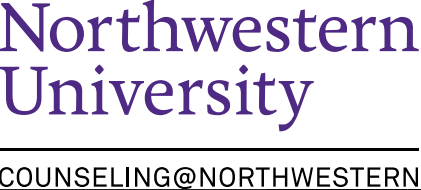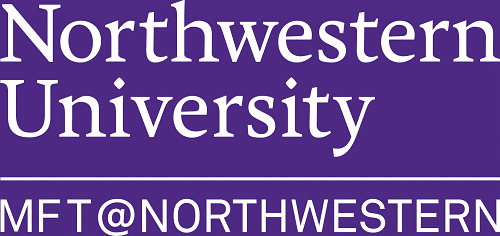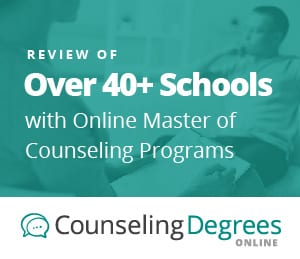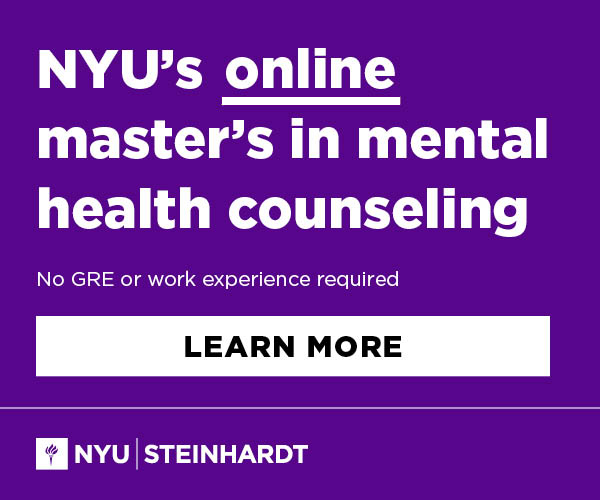 Northwestern University : Online MA in Counseling (CACREP Accredited)
Northwestern University : Online MA in Counseling (CACREP Accredited) Northwestern University : Master of Science in Marriage and Family Therapy (Complete your COAMFTE-accredited MFT online program in as few as 21 months. No GRE required.)
Northwestern University : Master of Science in Marriage and Family Therapy (Complete your COAMFTE-accredited MFT online program in as few as 21 months. No GRE required.) Walden University : PhD in Counselor Education and Supervision, Marriage, Couple, and Family Counseling (HLC Accredited)
Walden University : PhD in Counselor Education and Supervision, Marriage, Couple, and Family Counseling (HLC Accredited) Walden University : MS in Marriage, Couple, and Family Counseling (CACREP Accredited)
Walden University : MS in Marriage, Couple, and Family Counseling (CACREP Accredited) Walden University : MS in School Counseling (CACREP Accredited)
Walden University : MS in School Counseling (CACREP Accredited) Walden University : MS in Clinical Mental Health Counseling (CACREP Accredited, six specializations to choose from)
Walden University : MS in Clinical Mental Health Counseling (CACREP Accredited, six specializations to choose from) Grand Canyon University : Master's Degree in Counseling (As a private university, GCU has the same in-state and out-of-state tuition.)
Grand Canyon University : Master's Degree in Counseling (As a private university, GCU has the same in-state and out-of-state tuition.) Liberty University : MA: Clinical Mental Health Counseling (CACREP Accredited) (Online with required intensives)
Liberty University : MA: Clinical Mental Health Counseling (CACREP Accredited) (Online with required intensives) Liberty University : MA: Marriage and Family Therapy (Online with required intensives)
Liberty University : MA: Marriage and Family Therapy (Online with required intensives)Consider a Featured Online Counseling Program
| School and Program Information | Online Program? Entry Requirements |
Course Information |
|---|---|---|
| Northwestern University
Online MA in Counseling
 CACREP Accredited CACREP Accredited |
✔ Online
GRE Not Required Bachelor's Required |
Prepare to pursue licensure in as few as 18 months Learn MoreFull-time, part-time, and accelerated track options available |
| Northwestern University
Master of Science in Marriage and Family Therapy
COAMFTE Accredited |
✔ Online
GRE Not Required Bachelor's Required |
The COAMFTE-accredited MFT@Northwestern is offered by The Family Institute at Northwestern University. Full-time students can complete the program in as few as 21 months. No GRE is required, but applicants must hold an undergraduate degree. Full and part-time tracks available. Learn More |
| Walden University
PhD in Counselor Education and Supervision, Marriage, Couple, and Family Counseling
HLC Accredited |
✔ Online
|
In the PhD in Counselor Education and Supervision with a specialization in Marriage, Couple, and Family Counseling, you’ll look at human sexuality and empirically supported treatments and techniques for promoting the well-being of couples. Build competencies for working effectively with children and adolescents. You’ll also learn how to assess procedures for evaluating research in this area—and how to apply these findings to your practice. Learn More |
| Walden University
MS in Marriage, Couple, and Family Counseling
 CACREP Accredited CACREP Accredited |
✔ Online
|
Learn how to support the well-being of your students as they cope with complex personal and family challenges. Explore human sexual development as well as the relationships and family dynamics impacting young people’s lives today. Build the cross-cultural competencies and skills required to understand family structures, life-cycle dynamics, intergenerational influences, and healthy family functioning. The optional accelerated track is designed for students who are interested in taking three courses per quarter and potentially finishing their program in a shorter time frame. The accelerated track has the same curriculum, residencies, and field experience requirements as the general track, but requires a strong time commitment and is best suited for students who can dedicate themselves full time to their studies. Learn More |
| Walden University
MS in School Counseling
 CACREP Accredited CACREP Accredited |
✔ Online
GRE scores not required |
School counselors help students overcome obstacles and shape successful futures. Walden’s online MS in School Counseling program will give you a solid foundation in school counseling theories, approaches, and best practices while enabling you to gain hands-on experience. Learn More |
| Walden University
MS in Clinical Mental Health Counseling
 CACREP Accredited CACREP Accredited |
✔ Online
GRE scores not required |
Mental health counselors play a valuable role in helping people cope with life’s challenges. Walden’s online MS in Clinical Mental Health Counseling program can help you become the competent, compassionate counselor you know you can be. Learn More |
| Grand Canyon University
Master's Degree in Counseling
HLC and NASAC Accredited |
✔ Online
|
Clinical Mental Health Counseling master's degree emphases include: Childhood and Adolescence Disorders, Christian Counseling, Marriage and Family Therapy, and Trauma. Designed to meet the academic requirements of the National Board for Certified Counselors for the National Certified Counselor credential, the Certified Clinical Mental Health Counselor credential and the Arizona Board of Behavioral Health Examiners. As a private university, GCU has the same in-state and out-of-state tuition. Learn More |
| Liberty University
MA: Clinical Mental Health Counseling (CACREP Accredited)
 CACREP Accredited CACREP Accredited |
✔ Online
Online with required intensives |
Our CACREP-accredited master’s in counseling degree online can help you become an ethical, well-trained mental health counselor with the knowledge, values, and skills you need to empower others to make positive changes in their lives. Online and on campus. Training Champions for Christ since 1971. Learn More |
| Liberty University
MA: Marriage and Family Therapy
SACSCOC |
✔ Online
Online with required intensives |
A Liberty University marriage and family therapy master’s program online can prepare you to help individuals, couples, and families find healing through counseling. Online and on campus. Training Champions for Christ since 1971. Learn More |
*Sponsored Counseling Programs
Online CACREP Accredited programs | Online MPCAC Accredited programs
 Northwestern University - Online MA in Counseling (CACREP Accredited)
Northwestern University - Online MA in Counseling (CACREP Accredited)
 Northwestern University - Master of Science in Marriage and Family Therapy (COAMFTE Accredited)
Northwestern University - Master of Science in Marriage and Family Therapy (COAMFTE Accredited)
 Walden University - MS in Marriage, Couple, and Family Counseling (CACREP Accredited)
Walden University - MS in Marriage, Couple, and Family Counseling (CACREP Accredited)
 Walden University - MS in School Counseling (CACREP Accredited)
Walden University - MS in School Counseling (CACREP Accredited)
 Walden University - MS in Clinical Mental Health Counseling (CACREP Accredited)
Walden University - MS in Clinical Mental Health Counseling (CACREP Accredited)
 Grand Canyon University - Master's Degree in Counseling (NASAC Accredited)
Grand Canyon University - Master's Degree in Counseling (NASAC Accredited)
 Liberty University - MA: Clinical Mental Health Counseling (CACREP Accredited) (CACREP Accredited)
Liberty University - MA: Clinical Mental Health Counseling (CACREP Accredited) (CACREP Accredited)
 Liberty University - MA: Marriage and Family Therapy (SACSCOC Accredited)
Liberty University - MA: Marriage and Family Therapy (SACSCOC Accredited)
What Is a Counselor?
To start, consider each of the two roles individually. One of the most common career fields for students interested in mental health is counseling. Professionals who have achieved the rank of counselor within their organization can be very important and influential in their clients’ lives. The role of the counselor can vary according to the needs of the client, making this a versatile field for those trained to provide guidance in a clinical setting.
Counselors use proven techniques to assess, diagnose, and treat the people who come to them for help. Counseling patients may include those who have experienced loss in their lives, families struggling to find common ground, or even individuals diagnosed with mental health illnesses or disorders.
In some counseling jobs, you could work with people who have a specific diagnosis, such as depression, anxiety, or even schizophrenia. Other mental health disorders that counselors may treat include intermittent explosive disorder, attention deficit hyperactivity disorder (ADHD), and bipolar disorder.
As a counselor, your duties can include general clinical assessments, creating and implementing effective and relevant treatment plans over the course of several one-on-one sessions with your clients. Depending on your clients’ needs, you may use different types of therapy to help them achieve the goals of their treatment plans.
What Is a Therapist?
During difficult circumstances, therapy may be a significant factor in changing one’s outlook of a situation. Therapists can provide support to clients with a diverse set of needs, making them vital for helping their clients cope with life’s hardships.
Therapists differ from counselors in that their credentials can include a wide range of degree majors. Graduates from schools of social work; psychology; and even specialized areas, such as marriage and family therapy (MFT), can become licensed therapists after meeting the educational and practical guidelines within their state.
In some areas of therapy, professionals hold degrees in the field of psychology rather than counseling. This discipline allows you to explore some of the scientific principles of behavior, different modes of testing, and varied treatment options that other therapists in the field use.
Counselor vs. Therapist: Online Programs to Consider
No matter whether you choose a counselor or therapist path, enrolling in an online program can be a critical first step toward cultivating the right skills and competencies for success. Counseling programs should hold accreditation from the Council for the Accreditation of Counseling and Related Educational Programs (CACREP), making your search more centered on high-quality options in your area.
In the list below, you can see a couple of online and accredited options offered to students looking for counseling careers. Whether you choose to pursue your certification through online or on-campus programs, accreditation and quality should be your primary considerations before moving forward.
- North Carolina Central University: Online Master of Arts in Clinical Mental Health Counseling, School Counseling, and Career Counseling
- Regent University: Online Master of Arts in Clinical Mental Health Counseling; Marriage, Couples, and Family Counseling; and School Counseling
The path to becoming a licensed therapist should consist of similar aspirations and considerations as the counseling track listed above. If you would like the most flexibility with your program, online options may be your best choice as you step into college programs within your field.
Since therapists can come from various specializations and certification areas, you may have many more diverse degree programs to choose from to find your perfect fit. Some students find psychology-based master’s degrees to be a great complement to their skills, while others may find social work or therapy-specific concentrations to be more reflective of their goals in the field. Take a look at a few programs that the Council on Social Work Education (CSWE) and the Commission on Accreditation for Marriage and Family Education (COAMFTE) have accredited:
- California State University: Online Master of Clinical Social Work (CSWE accredited)
- Alliant International University: Online Master’s in Marriage and Family Therapy (COAMFTE accredited)
Educational Requirements
With either profession, you will need to earn a master’s-level education to get the licensure you need to practice.
The big distinction between becoming a counselor vs. a therapist is in the type of degree program you choose. The field of counseling usually requires that you enroll in a Master of Counseling program or even an alternative specialized option such as:
- Clinical mental health counseling
- School counseling
- Career counseling
Choosing a specialization can help you qualify for careers in the agencies that serve the purpose that is most closely related to your own personal mission.
People considering a career as a therapist can choose from a wide variety of program types. These can include the following:
- Master of Counseling
- Master of Social Work
Browsing the various forms of therapy and specialized practice available in the field can assist you with finding a program that gets you in touch with the population you would most like to serve.
Finishing a master’s program at your school is not the only step to consider for entry into either of these fields. One of the most important requirements for counseling and therapy is your supervised clinical experience. This aspect usually occurs at points during your coursework, as well as continuing after your graduation.
Classes to Take
In considering the counselor or therapist role, a few common courses may prove foundational:
- Ethics and Legal Issues: This course may include a look into the history and development of the field of mental health. It may also explore current trends leading the field as well as the cultural expectations of professional mental health, providing upcoming professionals with a strong foundation and understanding of their practice in the professional environment. Current laws, regulations, and expectations may also be reviewed as part of learning in this class.
- Diagnosis and Assessment: The process of diagnosis beginning with a clinical intake should follow a certain set of guidelines followed by all mental health professionals. This course outlines the process by which professionals make clinical decisions that can dictate treatment for their patients. Students in this course may study and practice from the DSM-5 in an effort to become more familiar with common mental health illnesses and disorders, as well as the assessment processes available for use in clinical settings.
- Individual and Group Counseling/Therapy: Different methods and skills in your field can assist you in obtaining careers in diverse fields and help you work with a wide range of clients during your career. The dynamics of individual and group counseling and therapy can be very different depending on your specialization, making this course extremely important for your professional development. Communication, technique, and activity introduction are just a few of the topics you may focus on in this course.
Counseling Licensure
In fields responsible for providing mental health services to the public, you should expect to see strict licensing requirements. Regardless of whether you choose a career path in the field of counseling or therapy, you might be expected to complete an accredited degree option as well as work through a clinical experience requirement.<
Searching for accredited programs can be done by exploring the websites of popular accreditation agencies, such as CACREP and CSWE. These agencies can provide you with a list of verified online college programs to browse, even by state and current accreditation status.
Types of Counseling Licensure
Below are some of the licenses you can pursue in counseling, therapy, social work, and behavior analysis.
- Counseling Licensure Guide
- State Counseling Licensure
- What It Takes to Become a Counselor
- LPC: Licensed Professional Counselor
- LFMT: Family and Marriage Therapist
- LCSW: Licensed Clinical Social Worker
- LMHC: Licensed Mental Health Counselor
- CCMHC: Certified Clinical Mental Health Counselor
- MAC: Master Addictions Counselor
- BCBA: Board Certified Behavior Analyst
- NCC: National Certified Counselor
- NCSC: National Certified School Counselor
- LCPC: Licensed Clinical Professional Counselor
- LPCC: Licensed Professional Clinical Counselor
Online counseling and therapy programs may also include practicum or internship components to assist you in getting started as a practitioner in your field. These experiences can contribute to your overall field requirements for licensure, which continue after you have received your degree.
Overall, most field requirements generally consist of around two years of supervised experience in the field, which is completed under the direct supervision of a licensed professional. This allows you to gain your needed experience for licensure while helping clients work through pressing issues in their personal lives.
At the end of your clinical experience, you may be required to also pass a licensure examination and state law test that is specific to your state’s expectations of mental health professionals. Once you have progressed through these tests of your ability, you can be eligible for a license and ready to work in your community.
Counselor vs. Therapist Career Path
Several subspecialties in counseling and mental health treatment are worth pursuing. Here are just a few of the most common examples.
School Counselor vs. Therapist
The biggest distinction between a school counselor vs. therapist is that school counselors are more narrowly focused on working within an academic setting and on helping students address a range of issues that may relate to education and career (e.g., applying to college) or other psychological issues (e.g., bullying, self-esteem, or even problems with substance abuse).
Mental Health Counselor vs. Therapist
Between themental health counselor vs. therapist roles, a licensed mental health counselor has more advanced and specialized training to address mental health disorders. These disorders may include depression, anxiety, or trauma. A therapist may help clients talk through some of these issues, but their practice tends to be focused on more general issues, such as difficulties with family or relationships.
Licensed Professional Counselor vs. Therapist
There is significant crossover between the licensed professional counselor vs. therapist roles, and the terms may sometimes be used interchangeably. The big distinction in terms of day-to-day practice is that a licensed counselor may have a practice more narrowly focused on addressing mental health issues, whereas therapists can be more generalized.
Specialization is also the main distinction between the marriage counselor vs. therapist roles. The former is simply a more focused field, allowing you to work with individuals and with couples to address problems within their relationship or family dynamics more generally.
Counselor vs. Therapist vs. Psychologist vs. Psychiatrist
Where do psychologists and psychiatrists fit into all of this? To understand the distinctions between counselor vs. therapist vs. psychologist vs. psychiatrist roles, a good rule of thumb is that psychologists study mental behaviors and processes. They also tend to be more focused on diagnosing and treating clinical mental health disorders. In some cases, they may recommend that their patients see a counselor or therapist to talk through some of their struggles. Meanwhile, a psychiatrist is a mental health professional with a medical degree and thus the ability to prescribe medications as needed.
Find the Right Counselor or Therapist Degree
If you are interested in a career in mental health, you should take a deeper look into what each career path entails. Explore some resources with program details, specific courses and specializations, and schools that are currently accepting applicants. Find the right program for you and start your path toward professional success.
- Online Counseling Programs
- Online MA in Counseling Degrees
- Bachelors in Online Counseling – 81 Degrees
- Master’s Degrees in Counseling
- Counseling Schools by State
- Counseling Career Guide
- The 12 Highest-Paying Counseling Jobs to Consider
Sources
Commission on Accreditation for Marriage and Family Therapy Education, Directory of COAMFTE Accredited Programs
Council for the Accreditation of Counseling and Related Educational Programs, Find a Program
Council on Social Work Education, Directory of Accredited Programs
Healthline, “How to Choose a Counselor vs. Therapist”
Indeed, Clinical Psychologist vs. Therapist: What Is the Difference?
Indeed, Mental Health Counselor vs. Psychologist: What’s the Difference?
Mana Medical Associates, “Therapist vs. Psychologist vs. Psychiatrist: What’s the Difference?”
Psychology Today, “What’s the Difference Between Counselors and Therapists?”
U.S. Bureau of Labor Statistics, Marriage and Family Therapists
U.S. Bureau of Labor Statistics, Psychologists
U.S. Bureau of Labor Statistics, Substance Abuse, Behavioral Disorder, and Mental Health Counselors
U.S. Bureau of Labor Statistics, Therapists, All Other










